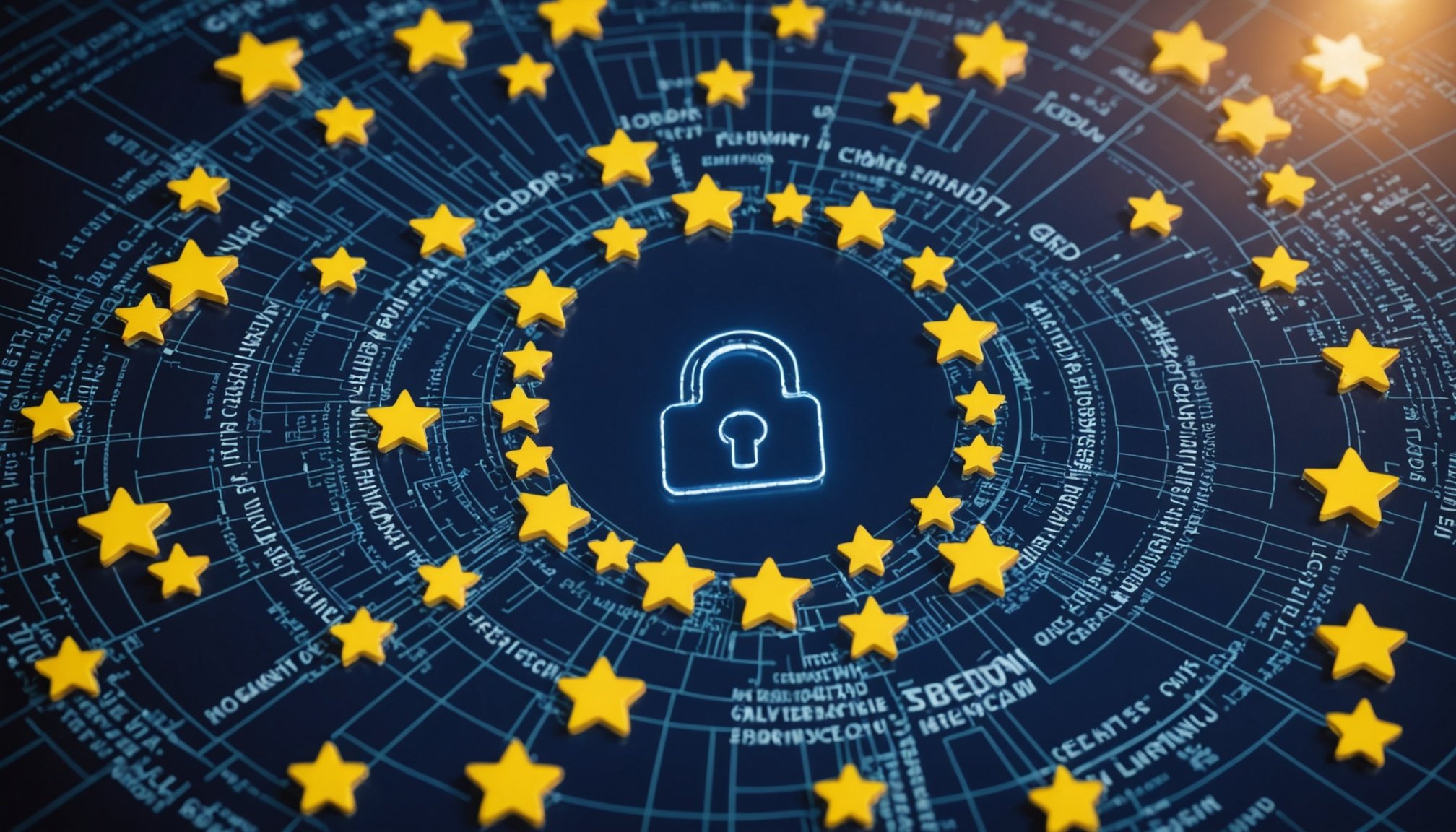Understanding GDPR Compliance
Navigating GDPR requirements can be a daunting task for UK enterprises, but understanding them is essential. The General Data Protection Regulation (GDPR) is crucial for safeguarding personal data and ensuring privacy. It outlines a compliance framework that organisations must follow to protect customer information, highlighting its significance.
At the heart of GDPR are several key principles. Firstly, transparency is vital; businesses must communicate clearly about data collection and use. Secondly, data minimisation requires only collecting data that is necessary. Finally, integrity and confidentiality necessitate appropriate security measures to avoid breaches. These principles serve as the foundation for GDPR’s data protection laws.
Topic to read : Hydrogen storage solutions: safety and efficiency redefined
UK enterprises face specific legal obligations under GDPR. Organisations must appoint a Data Protection Officer if they handle large-scale data. They must also ensure data breach notifications occur within 72 hours. Failure to meet these obligations could lead to severe consequences.
Non-compliance may result in substantial financial penalties. Businesses could face fines of up to €20 million or 4% of annual global turnover, whichever is higher. This demonstrates the importance of the data protection laws and maintaining a robust GDPR compliance framework to avoid hefty penalties.
Also to discover : Revolutionary hydrogen storage options for enhanced safety and efficiency
Key Compliance Challenges for UK Enterprises
Navigating the intricate path of compliance can present several challenges for UK enterprises. A prevalent issue is the effective perception and management of data subject rights. Organisations often struggle with the practical application and understanding of these rights, which encompass the right to access, rectify, erase, and restrict processing of personal data. When organisations fail to anticipate the resource-intensive nature of these responsibilities, they can risk non-compliance.
Secondly, resource allocation is crucial for maintaining compliance. Enterprises frequently need to reallocate time, money, and personnel to meet regulatory demands. Underestimating the extent of these requirements can lead to ineffective compliance strategies and overwhelmed staff, highlighting the need for robust planning and informed resource distribution.
Training is also vital for ensuring team members fully understand their role in the compliance ecosystem. Proper training equips employees with essential knowledge to handle compliance matters confidently. It fosters a culture of awareness where every team member is prepared to tackle compliance challenges, from understanding regulation updates to managing data requests efficiently. Without this, organisations may continue to grapple with gaps in understanding and execution.
By addressing these compliance challenges proactively, UK enterprises can minimise potential risks and maintain stronger operational foundations.
Practical Steps for Achieving Compliance
Navigating the complexities of GDPR requires a clear plan. Here’s a step-by-step guide for creating a GDPR compliance roadmap, crucial for UK enterprises aiming to align themselves with regulatory standards.
-
Assess Current Practices: Begin with a comprehensive audit of your current data processing activities. Identify gaps and areas needing improvement.
-
Develop a GDPR Roadmap: Outline the necessary actions, prioritising tasks based on risk and impact. This document should provide a strategic guide.
-
Create a Compliance Checklist: Your checklist should include:
- Data Mapping: Document all data flows.
- Policy Updates: Revise privacy notices and data protection policies.
- Implementing Consent Mechanisms: Ensure data subject consent complies with GDPR standards.
-
Training and Awareness: Educate employees about GDPR requirements and their roles in maintaining compliance.
-
Establish Ongoing Monitoring: Continuous monitoring is pivotal. Regularly review and update data handling practices to adapt to legislative changes.
-
Documentation and Record-Keeping: Maintain records of processing activities, consent, and data breaches as part of compliance efforts.
By rigorously following this roadmap and utilizing a compliance checklist, organisations can systematically address GDPR requirements. Ongoing monitoring and adaptation further ensure that compliance is sustained in the face of evolving data protection challenges.
Case Studies of Successful Compliance
Diving into case studies reveals how UK enterprises have successfully navigated the complex terrain of GDPR compliance. These success stories demonstrate the implementation of strategic changes and proactive approaches to data protection.
One notable example is a leading financial institution that revamped its data management systems. By adopting best practices such as encrypting customer data and conducting regular privacy impact assessments, the institution enhanced its security framework. This approach not only ensured compliance but also strengthened customer trust.
Another success story comes from a healthcare provider focused on mitigating risks associated with patient data. They mapped out data flows meticulously, ensuring minimisation of data collection. Additionally, they provided thorough training for employees at all levels, emphasising the importance of safeguarding sensitive information.
The lessons learned from these enterprises are valuable across industries. For instance, maintaining transparency with data subjects is a practice that other organisations can adopt. Transparent communication builds trust and aligns companies with GDPR requirements.
Enterprises can also benefit by appointing a dedicated Data Protection Officer (DPO). This role serves as a cornerstone for maintaining adherence to data regulations, acting as a bridge between the enterprise and regulatory bodies. Thus, strategies from these case studies provide a practical roadmap for achieving and maintaining GDPR compliance.
Expert Opinions on GDPR Compliance
In the realm of GDPR compliance, expert insights prove invaluable. Data protection specialists provide guidance on effective compliance strategies, tailoring approaches to suit various business needs. Professional advice often highlights the importance of understanding data collection and processing principles to ensure adherence.
Experts frequently discuss common pitfalls, such as neglecting user consent requirements or inadequate data protection measures. Avoidance strategies include implementing robust cybersecurity protocols and conducting regular audits to identify vulnerabilities. By heeding expert advice, companies can navigate these challenges efficiently.
The significance of GDPR consultancy cannot be overstated. Professionals in this field offer comprehensive support, helping businesses align operations within the GDPR framework. This guidance is particularly beneficial for companies lacking internal data protection resources, as it ensures informed decision-making.
Engaging with GDPR consultants enables organisations to benefit from tailored advice, enhancing their understanding and implementation of compliance measures. Overall, expert insights and professional advice are essential to mastering GDPR’s complexities, reducing legal risks, and fostering consumer trust.
Legal Implications of Non-Compliance
Failure to comply with data protection regulations can result in severe legal consequences for enterprises in the UK. Organizations that neglect these responsibilities face potential data breaches, leading to unauthorized access to sensitive information. Such breaches can have a devastating impact, causing loss of consumer trust and reputational damage. Additionally, breaches can incur significant fines, which are calculated based on the severity and scope of the violation.
UK legislation, notably under the GDPR, establishes clear guidelines on how businesses must handle personal data. Non-compliance can lead to financial penalties, where fines may reach up to €20 million or 4% of the company’s annual global turnover, whichever is higher. This severe structure indicates the importance of adherence to these regulations, as even unintentional errors can result in substantial financial obligations.
Moreover, companies subjected to fines must also engage in extensive recovery and mitigation efforts. This can include implementing new security measures, training personnel, and sometimes public disclosures about the breach. In the increasingly digital landscape, UK enterprises must prioritize data protection to avoid these kinds of sanctions and foster a trustworthy relationship with consumers.
Future Trends in Data Protection
With technology evolving rapidly, data protection is facing a substantial evolution. Particularly, the GDPR may see significant modifications in the coming years. Predictions suggest updates to adapt to new technologies and practices, with a focus on improving data privacy.
UK enterprises should be especially vigilant about new trends such as advanced encryption methods and AI-based security systems. These innovations offer enhanced protection, ensuring sensitive information remains confidential and secure. The evolution in data protection seeks to address emerging privacy challenges, thereby bolstering trust between companies and consumers.
Keeping abreast of changing regulations and trends becomes imperative for businesses to remain compliant and protect consumer data effectively. Regular updates and training sessions on evolving regulations can help businesses stay prepared.
Understanding future trends in data protection helps organizations align their strategies with anticipated regulatory changes. By doing so, businesses can ensure they are not only protecting data but also fostering a culture of trust and transparency.











